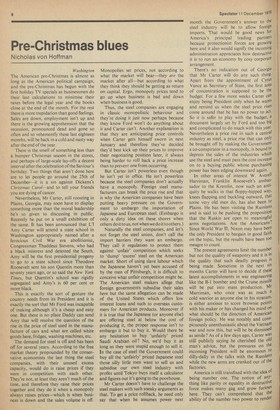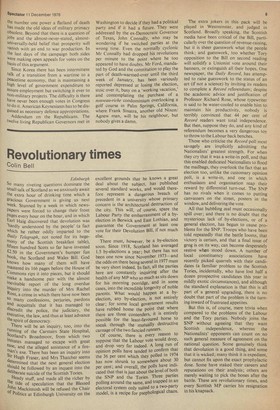Pre-Christmas blues
Nicholas von Hoffman
Washington The American pre-Christmas is almost as long as the American political campaign, and the pre-Christmas has begun with the first holiday TV specials as businessmen do their last calculations to minimise their taxes before the legal year and the books close at the end of the month. For the rest there is more trepidation than good feelings. Sales are down, employment isn't up and there is the growing apprehension that the recession, pronounced dead and gone so often and so vehemently these last eighteen months, will be back in a cold and nasty way after the end of the year.
There is the smell of something less than a bumper Christmas season in the stores, and perhaps of large-scale lay-offs a decent interval after the celebration of the Saviour's birthday. Two things that aren't done here are to let people go around the 25th of December—it is a sin against Dickens's Christmas Carol--and to tell your friends you are dying of cancer.
Nevertheless, Mr Carter, still roosting in Plains, Georgia, may soon have to display something more than the moral leadership he's so given to discussing in public. Recently he put on a small exhibition of the same. It has been announced that Li Amy Carter will attend a state school in Washington appropriately named after a ferocious Civil War era abolitionist, Congressman Thaddeus Stevens, who had a black mistress and detested the South. Amy will be the first presidential progeny to go to a state school since Theodore Roosevelt sent his son Quentin more than seventy years ago, or so said the New York Times, but Quentin's school was rigidly segregated and Amy's is 60 per cent or more black.
This is exactly the sort of gesture the country needs from its President and it is exactly the sort that Mr Ford was incapable of making although it's a cheap and easy one. But there is no place Daddy can send Amy that will resolve the question of the rise in the price of steel used in the manufacture of cars and what are called white goods here, fridges, washing machines, etc.
The demand for steel is off and has been off for several years. According to the free market theory propounded by the conservative economists the last thing the steel companies, with their unused excess capacity, would do is raise prices if they were in competition with each other. They're not, at least they aren't much of the time, and therefore they raise their prices together and they do it when a monopoly always raises prices—which is when business is down and the sales volume is off. Monopolies set prices, not according to what the market will bear—they are the market after all—but according to what they think they should be getting as return on capital. Ergo, monopoly prices tend to go up when business is bad and down when business is good.
Thus, the steel companies are engaging in classic monopolistic behaviour and they're doing it just now perhaps because they know Ford won't do anything about it and Carter can't. Another explanation is that they are anticipating price controls when Carter gets himself sworn in next January and therefore they've decided they'd best kick up their prices to improve their negotiating position later, it always being harder to roll back a price increase than to prevent one from occurring.
But Carter isn't powerless even though he isn't yet in office. He isn't powerless because the steel companies don't actually have a monopoly. Foreign steel manufacturers can break the price rise and that is why the American companies have been putting heavy pressure on the Government to embargo the importation of Japanese and European steel. (Embargo is only a dirty idea on these shores when others do it to us, not when we do it to others.) Naturally the steel companies, and let's not forget the steel union, don't call the import barriers they want an embargo. They call it regulation to protect them against 'unfair' competition which seeks to 'dump' excess' steel on the American market. Short of using slave labour which the Japanese haven't yet been accused of by the men of Pittsburgh, it is difficult to conceive what unfair competition might be. The American steel makers allege that foreign governments subsidise their sales here but the same allegation can be made of the United States which offers low interest loans and such to overseas customers for American products. Moreover if it is true that the Japanese (or anyone else) are offering steel at below the cost of producing it, the proper response isn't to embargo it but to buy it. Would there be any hesitation to buy 'unfairly' priced Saudi Arabian oil? No, we'd buy it as long as they were stupid enough to sell it. In the case of steel the Government could buy all the 'unfairly' priced Japanese steel those silly little men want to sell us and subsidise our own steel industry with profits until Tokyo buys itself a calculator and figures out it's going to the poorhouse.
Mr Carter doesn't have to challenge the steel makers with such sneaky arguments as that. To get a price rollback, he need only say that when he assumes power next month the Government's answer to the steel industry will be to allow foreign imports. That would be good news for America's principal trading partners because protectionist forces are growing here and it also would signify the incoming administration appreciates how destructive it is to run an economy by cosy corporate arrangement.
There's no indication out of Georgia that Mr Carter will do any such thing. Apart from the appointment of Cyrus Vance as Secretary of State, the first area of concentration is supposed to be the budget. For a few more weeks Carter can enjoy being President only when he wants and remind us when the steel price rises come around that he has no power to act. So it is safer to play with the budget, .a document largely set by Ford and too big and complicated to do much with this year. Nevertheless a price rise in such a central industry as steel, a price rise that can onlY be brought off by making the Government a co-conspirator in a monopoly, is bound to depress the sales of the industries which use the steel and must pass the cost increase on to a buying public whose purchasing power has been edging downward again.
In other areas of interest W. Averell Harriman, Franklin Roosevelt's ambassador to the Kremlin, now such an antiquity he walks in that floppy-hipped way, knees flapping and buckling outward, that some very old men do, has also been to Plains. He has been visiting the Russians and is said to be pushing the proposition that the Ruskis are open to meaningful arms negotiations. Are the Americans? Since World War H, Nixon may have been the only President to bargain in good faith on the topic, but the results have been too meagre to count.
The present agreements limit the number but not the quality of weaponry and it is In the quality that such deadly progress ts being made. Sometime in the next sot months Carter will have to decide if these latest accomplishments in war engineering like the B-I bomber and the Cruise missile will be put into mass production. Mr Marriman, who once was as much a cold warrior as anyone else in his stratuni, is either anxious to score brownie points with his maker or has changed his mind 00 what should be the direction of American foreign policy. He was notably and conspicuously unenthusiastic about the Vietnarn war and now this, but will he be dismissed as senile? As of a few days ago, Carter was still publicly saying he cherished the old man's advice, but the pressures on the incoming President will be enormous to dilly-dally in the talks with the Russians while the new arms are cranked out of the factories. America is still transfixed with the idea of being number one. The notion of arlYthing like parity or equality in destructive force makes many gag and grow furious here. They can't comprehend that the ability of the number two power to render
the number one power a flatland of death has made the old ideas of military primacy Obsolete. Beyond that there is a question of Jobs and the almost-never-stated, almostuniversally-held belief that prosperity will vanish with an end to war production. in the last days of the campaign both sides were making open appeals for votes on the basis of this argument.
Since Korea there has been intermittent talk of a transition from a wartime to a Peacetime economy, that is maintaining a high level of government expenditure to assure employment but switching it over to non-military projects. The difficulty is there have never been enough votes in Congress to do it. American Keynesiasm has to be disguised as necessary defence appropriations.
Addendum on the Republicans. The twelve living Republican Governors met in
Washington to decide if they had a political party and if it had a future. They were addressed by the ex-Democratic Governor of Texas, John Connally, who may be wondering if he switched parties at the wrong time. Even the normally cyclonic Mr Connally had dropped his revolutions per minute to the point where he too appeared to have doubts. Mr Ford, mandated by God and the constitution to play the part of death-warmed-over until the third week of January, has been variously reported depressed at losing the election, stoic over it, busy on a 'working vacation,' and contemplating the purchase of a nouveau-riche condominium overlooking a golf course in Palm Springs, California, where Frank Sinatra, another old Nixon! Agnew man, will be his neighbour, but nobody gives a damn.



































 Previous page
Previous page